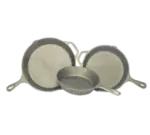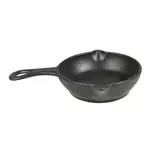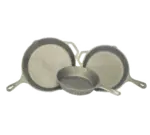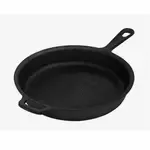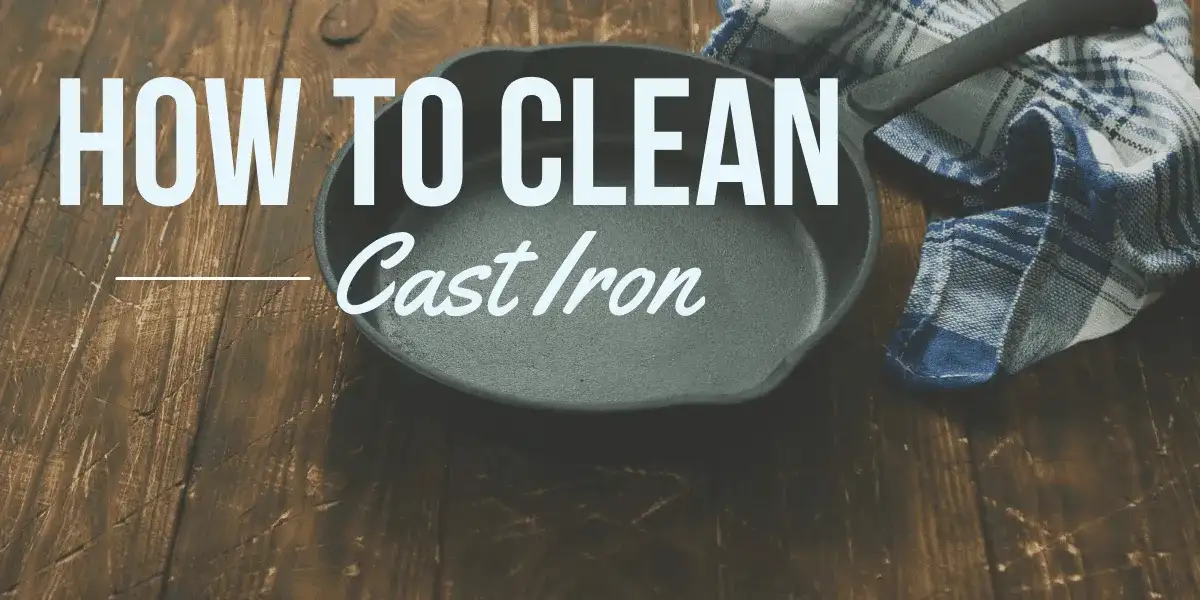
How to Clean Cast Iron After Cooking
If you're new to the world of cast iron cooking, it's important to learn the proper way to clean your cast iron after use. While it may be tempting to treat it like any other kitchen equipment and toss it in the sink or dishwasher, cleaning cast iron requires special care to maintain its quality and longevity. Follow these steps to ensure your cast iron stays in great shape for years to come, preserving its unique flavor and cooking properties.
Materials for Cleaning Cast Iron

Before you begin the cleaning process, gather the following materials. While some are optional, they are recommended for easier and more effective cleaning:
- Sponge or stiff brush
- Paper towels or a dry cloth
- Shortening or vegetable oil
- Kosher salt (optional)
- Stove (optional)
How to Clean Cast Iron Skillet After Cooking in 7 Steps

A cast iron skillet is a versatile and durable piece of smallware that requires proper cleaning to maintain its longevity and performance. In this guide, we will walk you through the correct way to clean a cast iron skillet, from removing stuck-on food to preventing rust. Follow these steps to keep your cast iron skillet in excellent condition for years to come.
1. Clean Your Cast Iron Immediately
After using your cast iron skillet, it's important to clean it promptly. Avoid letting it sit for an extended period, as this can make the cleaning process more difficult. By cleaning it immediately, you prevent food particles from sticking and ensure a smoother cleaning experience.
2. Use Hot Water
Begin the cleaning process by rinsing your cast iron skillet with hot water. Avoid using soap, as it can strip away the skillet's seasoning. The high temperature of the water helps to loosen any stuck-on food and makes it easier to remove.
3. Scrub off Anything Stuck to the Cast Iron
If you encounter any stubborn food residue, use a stiff brush or a non-abrasive sponge to scrub it off. Make sure to be gentle with your scrubbing to avoid damaging the seasoning. For tough-to-remove food particles, you can add coarse salt or baking soda to create a gentle abrasive paste.
4. Remove Any Rust
If you notice rust spots on your cast iron skillet, it's essential to address them promptly. To remove rust, sprinkle the affected area with salt and scrub it using a potato half. The salt acts as a natural abrasive, while the potato's juices help break down the rust. Rinse the skillet thoroughly and dry it completely.
5. Dry the Cast Iron Thoroughly
To prevent rust from forming on your cast iron skillet, it's crucial to dry it thoroughly after washing. Use a clean kitchen towel or paper towels to remove any excess water. Then, place the skillet on the stovetop over low heat to evaporate any remaining moisture. Make sure it's completely dry before proceeding to the next step.
6. Oil the Cast Iron
After cleaning and drying your cast iron skillet, it's time to apply a thin layer of oil to protect it from rust. Use a cloth or paper towel to rub a small amount of vegetable oil, flaxseed oil, or any other high-smoke-point oil onto the surface of the skillet, including the handle. Wipe off any excess oil to avoid a sticky residue.
7. Storing Your Cast Iron
To store your cast iron skillet, place a paper towel or a clean cloth on its surface to absorb any moisture. This helps prevent rust from developing during storage. Store the skillet in a dry place with enough airflow to maintain its pristine condition. Avoid stacking other heavy objects on top of it, as this can cause damage.
Whether you cook at home or are opening a restaurant, the above steps are a tried-and-tested method to preserve the kitchen’s most-preferred cookware.
What Not to Do When Cleaning Cast Iron

Cleaning cast iron requires special care due to its unique properties. Here are some important things to avoid when cleaning your cast iron cookware:
- Don't use soap: Avoid using soap to clean cast iron. The porous nature of cast iron means that soap can leave behind a flavor that will transfer to your food. Instead, opt for using salt and water to clean the cookware effectively.
- Use steel wool sparingly: While steel wool can be used to remove stubborn food and residue from cast iron, it should be used sparingly. Steel wool can also strip away the seasoning of the pan, which affects its non-stick properties. Try using boiling water first before resorting to steel wool, as it is less abrasive.
Final Thoughts on How to Clean Cast Iron After Cooking
Taking proper care of your cast iron cookware ensures its longevity and enhances its performance. With regular cleaning and storage in a dry area, a well-maintained cast iron skillet or pan can last for decades. Cast iron develops a seasoned surface over time, which adds unique flavors to your food and improves with age.
When cleaning cast iron after cooking, it's essential to be patient and follow the instructions provided. This will help prevent damage to the seasoning or the cookware itself. However, it's important to note that cast iron is resilient, and small mistakes can be rectified with proper care and maintenance. Enjoy the benefits of cooking with cast iron and savor the exceptional flavors it brings to your dishes.
FAQ
What is the correct way to clean cast iron?
The correct way to clean cast iron is to rinse it with hot water and scrub off any food particles using a stiff brush or non-abrasive sponge. Avoid using soap, as it can strip away the skillet's seasoning.
How to clean a cast iron pan that has been sitting?
If your cast iron pan has been sitting for a while, start by rinsing it with hot water and using a stiff brush or sponge to remove any stuck-on food. If there are rust spots, use salt and a half potato to scrub them away. Dry the pan thoroughly and apply a thin layer of oil before storing.
Do you clean cast iron after seasoning?
No, you should not use soap to clean a cast iron skillet after seasoning. Instead, rinse it with hot water and scrub off any food particles. Seasoning helps protect the skillet and develops over time with regular use.
Should I oil my cast iron after washing it?
Yes, it's recommended to apply a thin layer of oil to your cast iron skillet after washing and drying it. The oil helps to protect the skillet from rust.
Why should you not wash cast iron?
Washing cast iron with soap is generally not recommended as it can strip away the skillet's seasoning. However, rinsing it with hot water and scrubbing gently is sufficient for regular cleaning.
How long can you wait to clean cast iron?
It's best to clean your cast iron skillet immediately after use to prevent food particles from sticking. However, if you're unable to clean it right away, try to not wait longer than a few hours.
What happens if you don't clean cast iron?
If you don't clean cast iron properly, it can develop rust, become sticky, and lose its non-stick properties. Regular cleaning and maintenance are essential to keep your cast iron skillet in good condition.
